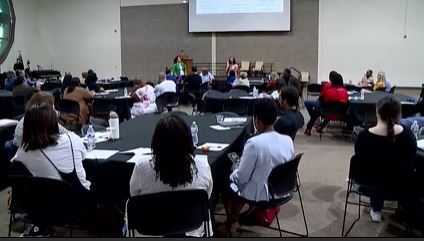Public health leader pledges $2 million to youth anti-gun violence campaign

INDIANAPOLIS — Marion County Public Health Director Dr. Virigina Caine told a gathering of community stakeholders at Martin University that her department was prepared to make a seven-figure commitment to the fight against youth gun violence in 2025.
”I will make a personal pledge next year of giving two million dollars, two million dollars to community-based organizations to help us address this cause,” Caine told her audience to applause. “That’s a personal organizational commitment but we’re gonna have some other people come to the plate to make this happen.”
After her announcement, Dr. Caine told FOX59/CBS4 she’s hoping to leverage the MCPHD commitment with pledges from Indianapolis philanthropic donors and companies to raise additional funds to specifically address gun violence that has targeted children in Marion County.
”There’s no way in a city of this size with the incredible number of organizations and companies that we have in this town that we can’t come up with the resources to make a difference for our youth to do something differently that we have to be concerned about gun violence,” she said. ” It’s up to all of us. We gotta band together. We gotta have that voice where we can make a difference to get that leadership from our companies and organizations. Everybody’s gotta live in this city. We want to have a healthy city where we wanna be comfortable and safe when we’re walking and we want our children to be safe when they’re out walking.”
Today’s funding promise took root in an interview the public health leader gave FOX59/CBS4 last summer when she said she recognized that juvenile gunshot injuries were becoming a public health and medical issue, taking a toll on families and requiring doctors and surgeons to address the firearms wounds of children.
Dr. Caine followed that acknowledgment with a community-wide meeting of stakeholders at Ivy Tech in December, a January conference that listed youth gun violence as one of MCPHD’s top four priorities in the coming decade and then a follow-up summit today.
The meeting was titled, “The First Response to Addressing Youth Gun Violence” and was attended by some 70 people including community program leaders, the Indianapolis Metropolitan Police Department and Office of Public Health and Safety officials, educators and teenagers.
The first priority of the MCPHD campaign is to create a dashboard and directory hub where parents, agencies and children can seek and share information about programs with an emphasis on curbing access to guns and dealing with the aftermath of trauma, both physical and mental.
Dr. Caine said she was particularly interested in hearing the stories of young people affected by violence and letting them tell their accounts directly to other youth in Marion County.
”This is our one opportunity to add the programs we think we should be adding and for everyone to see it in one place,” she said.
Kareem Hines of New B.O.Y. Mentoring and Youth Development brought a half-dozen of his teenagers to the conference and they were encouraged to give feedback on what would and wouldn’t work with the Health Department’s plans.
”Come down to their level. You got to use language,” said 18-year-old Patrick Collier. “You got to use food. You got to use any resource that you can. Art. Photography. Whatever a child is interested in, you got to come down to that level. Make it appealing to them because, kids, we’re not gonna go off that level or not if it’s good for me or not. I don’t care if it’s good for me. When you’re working with youth, or you’re for a cause that’s for better youth or support youth, or change the way a youth thinks when it comes to gun violence and handle issues and conflict resolution, you have to include them and think their strategies and what they’re thinking.”
A recent study by IU-Indy Professor Lauren Magee found that the number of juvenile shooting injuries in Indianapolis had increased 300% over the last six years and 14% of those injured children were repeat gunshot wound victims.
Already this year, Riley Hospital for Children has treated approximately 20 juveniles for gunshot wounds, including two fatalities.
Magee’s research found many juveniles carry guns as they perceived their peer group was also packing.
Collier said teens are armed because they feel isolated.
”I know little dudes that’s 14, 15, 13 that are carrying around guns because they feel alone and they don’t have anybody to protect them, they don’t have anybody to go to,” said Collier. “They don’t have any stable connections in the community that make them feel safe so they’re gonna walk around with a pistol and a gun and they’re gonna find community in the streets, they’re gonna find community in a gang.”
Dr. Caine challenged the stakeholders to complete a survey of their interests and assets while her staff prepared for the next conference and pledged to bring even more youth input to the conversation.

Comments are closed.